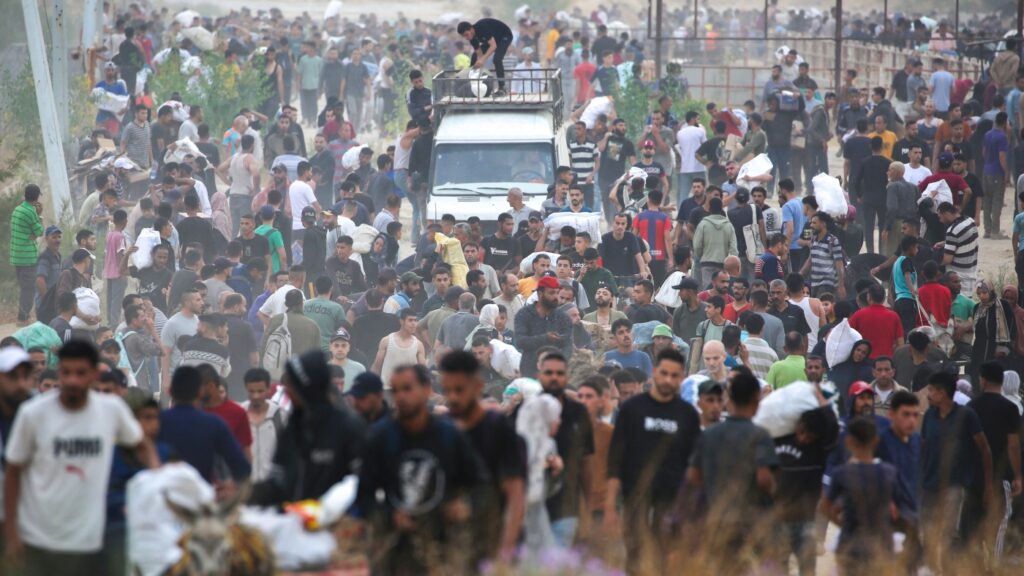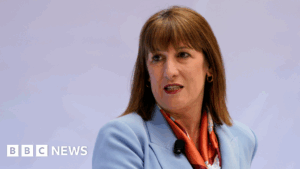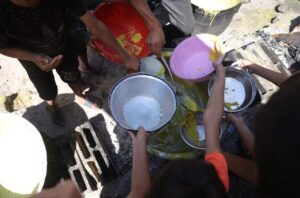
People carry relief supplies from the Gaza Humanitarian Foundation (GHF), a private US-backed aid group that has bypassed the longstanding UN-led system in the territory, as displaced Palestinians return from an aid distribution centre in the central Gaza Strip on June 8, 2025. The UN and major aid organisations have refused to cooperate with the GHF, citing concerns that it was designed to cater to Israeli military objectives. (Photo by Eyad BABA / AFP) (Photo by EYAD BABA/AFP via Getty Images)
TEL AVIV, Israel — Shahar Segal, an Israeli entrepreneur renowned for his chain of trendy restaurants, has taken on a new role as the spokesperson for the Gaza Humanitarian Foundation (GHF). This controversial food distribution group operates in the Gaza Strip, where recent reports indicate hundreds of Palestinians have been killed and thousands wounded by Israeli troops near GHF’s food distribution sites.
Segal, whose culinary empire includes the Michelin-starred Shmoné in Manhattan, has become the face of GHF in Israeli media. He defends the organization amidst criticism and violence, stating, “I believe this is the only right and possible way to deliver food to Gazans without feeding Hamas’ terror machine. It’s crystal clear,” as he communicated to NPR.
Violence and Controversy Surrounding GHF Operations
This past Tuesday, Gaza health officials reported that 44 Palestinians were killed by Israeli troops near GHF food sites. Among them was Osama Tarifi, a 23-year-old factory worker, who was trying to bring a GHF food parcel home. His uncle, Mohammed Tarifi, shared with NPR that Osama’s mother was against his decision due to the danger involved.
The U.S. government, which previously distanced itself from GHF, has now pledged $30 million in funding. State Department documents reveal internal discussions acknowledging media criticisms that GHF might be complicit in alleged Israeli war crimes. However, these documents also outline talking points praising GHF’s efforts and expressing skepticism about the reported killings, suggesting they are propagated by “Hamas-linked outlets.”
The Role of the U.S. and Leadership Changes
Johnnie Moore, a U.S. evangelical leader and former campaign adviser for President Trump, now heads GHF after its first director, a U.S. Marine veteran, resigned over concerns about adherence to humanitarian principles. This leadership change highlights the ongoing controversy surrounding GHF’s operations.
Since late May, GHF has been distributing food packages in Gaza, where severe Israeli restrictions have led to widespread hunger. Israel claims that Hamas diverts food from traditional aid agencies, while GHF distributes food under Israeli military supervision, supposedly without Hamas involvement.
International Criticism and Eyewitness Accounts
The U.N. and other humanitarian organizations refuse to collaborate with GHF, arguing that it serves Israeli military objectives and endangers civilians. Eyewitnesses report chaotic and dangerous conditions at GHF’s distribution sites, with the U.N. human rights office stating that at least 410 people have been killed by Israeli soldiers near these locations.
“Israel’s militarized humanitarian assistance mechanism is in contradiction with international standards on aid distribution,” said Thameen Al-Keetan, U.N. human rights office spokesperson. “The weaponization of food for civilians, in addition to restricting or preventing their access to life-sustaining services, constitutes a war crime.”
GHF denies allegations that Israeli troops have fired on Palestinians near their aid zones, maintaining that soldiers only fire warning shots at individuals approaching troops several hundred yards from the food sites.
Segal’s Transition from Restaurateur to Humanitarian Advocate
Segal, 61, along with his business partner, celebrity chef Eyal Shani, operates Miznon and several high-end restaurants globally. Before his involvement with GHF, Segal had a successful career in television advertising. Following the Hamas-led attack on Israel in October 2023, Segal utilized his branding skills to assist the Israeli military in enhancing its public messaging.
In a January 2024 interview on Israeli radio, Segal described his role in the military’s “influence” efforts, which he referred to as propaganda. “That’s the essence of this war. You’re fighting an enemy that’s winning on the narrative front,” he explained.
According to sources familiar with GHF’s activities, Segal’s connections with senior Israeli military officials may have facilitated his current role. Although Segal declined to comment on these claims, his involvement has sparked debate regarding the intersection of his culinary ventures and humanitarian efforts.
Public Perception and Future Implications
Segal asserts that GHF’s efforts demonstrate a more effective method of aid distribution that avoids empowering Hamas. Despite these claims, many Gaza residents report facing significant risks when approaching GHF distribution points due to overcrowding and potential violence from nearby Israeli troops.
Even when food is available, supplies often run out quickly, leaving many empty-handed. On a recent occasion, GHF announced the opening of a distribution site on its Facebook page, only to report that food had run out just eight minutes later.
“We understand this is such a heartless enterprise,” said Palestinian-American Hani Almadhoun, who co-manages the Gaza Soup Kitchen food project. “It is not the way to do humanitarian aid. … Palestinians end up being dead every time there is a food distribution.”
GHF has not disclosed its funding sources, although some Israeli media suggest the Israeli government may be a secret backer, a claim publicly denied by Prime Minister Benjamin Netanyahu. Meanwhile, private armed security contractors hired by a U.S. company continue to guard GHF’s distribution sites.
Israeli food writer Hila Alpert expressed belief in Segal’s good intentions. “I think that if Shahar does it, it’s only because he has his heart [in] the right place,” she said. “If someone brings food to Gaza, it’s better than nothing, no?”
As tensions persist and the humanitarian crisis in Gaza deepens, the role and impact of the Gaza Humanitarian Foundation remain subjects of intense scrutiny and debate.





